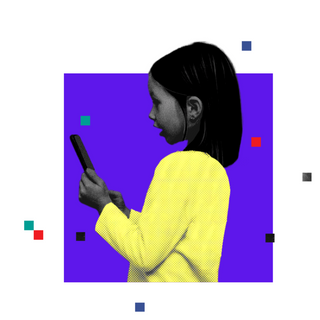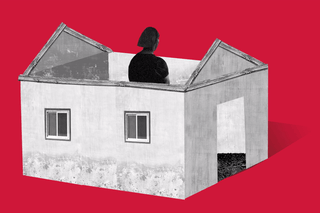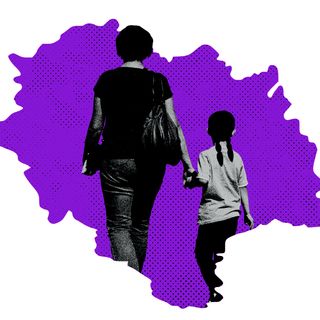
Inside Indian Queer Youths’ Struggle to Find Home
Many trans-queer youth leave abusive homes for shelters, only to be tracked down by police and sent back home.

“A queer couple in Kolkata eloped from their homes and took shelter at a friend’s place. Their location was traced through their phone and the family of one of the persons found out their whereabouts with the help of police within a month. In December 2019, in broad daylight, amongst the hustle and bustle of a busy locality of Kolkata, the family along with two men got hold of the couple, beat their child’s partner up, and dragged their daughter into a car. She was screaming, hauling, crying for help, her body bending in anguish as she was pulled up by the men into the car, but not a single person in the locality, not even the police bat an eye—after all, it’s a family matter!” recounts Koyel from Sappho For Equality, a feminist organization working for the rights and social justice of sexually marginalized women and transmen.
Home is imagined to be a safe place for people, but this is not the case for many Indian queer and trans people who experience various forms of violence at home, including emotional and physical abuse, being forced into heterosexual marriage, coercive rape for “straightening,” house arrest, withdrawal of financial support, etc. Many queer and trans people thus choose to leave their family* homes when this violence becomes unbearable to the extent where they fear for their life.
However, they continue to face violence by their families and police even at the shelter homes they attempt to take refuge at after leaving. How then do queer people exist in a world where they can’t escape violence both inside and outside their homes.
Adhila Nassarin (23) and Fathima Noora (23) were in the news recently after their parents violently separated them and tried to force them into heterosexual marriages. Eventually, a landmark judgment by the Kerala High Court allowed Adhila and Fathima to reunite in May 2022. But unlike them, in many cases, queer and trans people eventually succumb to the pressure and manipulation of the families and are forced to go back to abusive homes.
Related on The Swaddle:
In a study conducted by the National Human Rights Commission, it was found that only 2% of trans people stay with their parents. The rest, a staggering number, flee their family homes in hope of safety and shelter. In such cases, they often take refuge in shelter homes, such as Garima Grehs. The establishment of Garima Grehs comes as a result of The Transgender Persons (Protection Of Rights) Act 2019, which says that the appropriate government must take steps for the rescue, protection, and rehabilitation of transgender persons. There are a total of 12 Garima Grehs established by the Ministry of Social Justice and Empowerment to provide basic facilities like shelter, food, medical care, etc. to destitute and abandoned transgender persons. Many organizations working for the rights of queer and trans people also have independently funded drop-in centers and shelter homes.
These Garima Grehs too, however, are not always safe spaces. For instance, in July this year, a group of transgender persons at a Garima Greh in Delhi was assaulted by the Delhi Police, who came at midnight to record the statement of a trans man who was living there. A. had left home because his family had imprisoned and tortured him in a room for two years. The police came, created a ruckus, and assaulted the resident trans people – all in response to the missing person complaint filed by A.’s family.
“Families of queer people often (mis)use missing person complaints to trace their queer child or file abduction charges against their queer child’s partner in cases of elopement. The families in most cases are completely aware of why the person has fled/eloped from home, yet they take help through false recording of the case with the police. Whether it’s a missing person complaint or an FIR, the police will trace the person down to the best of their abilities and may look at call data records, ATM usage and social media. They also approach and question friends of the individual, the details of whom are supplied by the family.”
The missing person complaint and FIR give the police leeway to take action; in most cases, this action is not in accordance with the law but with the police persons’ moral understanding of “family values.” There is a lot of general disgust towards queer and trans people, which makes the police side with the families by default. The police thus judge queer and trans people for leaving home and not understanding that the family wants the “best for their children.” Queer people in custody are often given lectures telling them to “embrace what God has given” and not “challenge nature.”
This bias and judgment lead to many cases of the police dragging queer people to police stations, behaving abusively and violently toward them, and forcing them to go back to their family homes. No aspect of such police behavior is legal, which is why lawyers and activists often have to intervene and force the police to respect basic and fundamental rights by releasing the victim.
Most people in the police force don’t have any idea about the Transgender Act or government-sanctioned shelter homes, which breeds an extreme level of apathy and disdain. The police have a reductionist view of the gender identity of trans people, that leads to misgendering, violence, and brutality.
On September 1st, a person claiming to be a police inspector from UP, along with four other people, barged into a queer rights organization’s shelter home in Gurgaon to find his trans son. Upon finding out that their son was not there, the father and his accomplices beat Gautam and Shamin, the two board members of the shelter home. They were forcefully dragged to a police station and detained illegally for over four hours, where they suffered various physical injuries.
Apart from filing missing person complaints, families of queer people often also use abduction or trafficking charges to forcefully bring their children back.
“In one case in Bihar, there were two women who were in a relationship. One of the girls came out to her sister and was waiting for the right opportunity to also come out to her mother. But the sister outed her to the family and they locked her up, bringing two male members into the house to guard the person. She somehow managed to run away with her partner to Delhi. Her family filed a kidnapping case under IPC363 and IPC365. The idea is that the other person has kidnapped our daughter and then there are other sorts of allegations, such as brainwashing our child, making her queer—it is not part of the criminal offense, but added accusations made orally,” shares Mihir, talking about dealing with abduction cases filed by families of queer and trans people.
Related on The Swaddle:
In such cases, because kidnapping is a serious offense, there is a threat of arrest. One can’t get bail at the police station and has to apply to the court. This requires one to go back to their home state to record their statement, which is not just dangerous for queer and trans people who have managed to flee their homes but is also counterproductive.
Koyel, who has worked on many such crisis intervention cases, notes that families wanting someone back has more to do with their ego than genuine care for their child. “Especially for PAFB (person assigned female at birth), they are looked at as a commodity, who shouldn’t have the audacity to choose a life for themselves… They will manipulate by saying someone’s health is deteriorating because you aren’t here, or now that you have brought shame to the family, your brother won’t get a job, and your sister won’t be married.
Parents try all kinds of things. They file habeas corpus cases against organizations helping their child. Slut-shame the organization. Our office is in a residential area in Kolkata; often parents would come and scream, abuse, try to barge inside the organization with police, threaten us of assaulting, killing for helping the queer-trans person.”
Mihir also notes how families with social influence exploit the systems for their gain. “There is a strong sense of caste solidarity. In my experiences, I have seen families that might come from different places, such as Haryana, UP, find someone of their caste location in the police station in Delhi, and get work done through them.”
This violence by families and police are well-orchestrated attempts to disrupt everything that nurtures queerness. It creates panic within queer communities, making it difficult for people to access safety and survival.
Therefore, it is worth exploring some facts and pointers to keep in mind while leaving home and seeking shelter.
Most importantly, family has no right to claim their adult queer and trans children. Even without the Trans Act, the idea that one must live with their parents does not exist in the law. Adults have a constitutional right to decide where they live.
If you are a queer or trans person leaving home, ensure you have thought your plan through and mapped out all possible resources and outcomes. Take all important documents, and don’t take any money or valuables from home that doesn’t belong to you. Write a letter to the local police station in your handwriting stating that you are leaving of your own will and no one has forced you to do so. In the letter, also mention that you have not taken anything except legal documents that belong to you. This will make it difficult for families to file any missing complaints or abduction charges. Lastly, leave your phone and SIM at home. It is best to buy a basic phone and a new SIM. Do not circulate your new number.
When choosing a new location, it is important that it is either a shelter home meant for queer and trans people or a place where someone has the bandwidth and resources to absorb police threats. Living with another queer friend oftentimes puts both parties in a vulnerable position. Mihir recalls, “In one case in 2018, a couple ran away from Haryana and stayed with a Muslim queer friend and got assaulted by the Haryana police. Then they dialed 100 and again got assaulted by the Delhi police. The fact that the friend was Muslim made the police sense some kind of ‘conspiracy’ in the situation.”
Finally, if the police do barge into shelter homes or engage in custodial violence, it should be noted that they can be charged with criminal laws. Last year, the Madras High Court ordered that a specific clause be added to the Police Conduct Rules, providing that any harassment by a police person toward persons belonging to the LGBTQ+ community and/or to the activists and NGO workers will be treated as misconduct and entail punishment.
Although shelter homes might not be a permanent solution to ensuring safety for queer and trans people, they instill hope in many of them, creates spaces to meet other queer people, and offer solidarity when coming out of abusive family homes.
Queer and trans people’s lives are not only about resistance, retaliation, and rage. We deserve rest, safe spaces to live, breathe, exist, laugh, and loiter. We deserve care and love. We deserve a home.
*The author would like to note that, although the word “family” has been used to refer to birth families in this piece, many queer and trans people use the word to refer to their families of choice, which often don’t include people to whom they are related.
**An earlier version of this piece incorrectly stated that Adhila and Fatima were rescued in Kolkata. This line has now been removed from the piece.
LGBTQ+ helpline numbers:
Delhi
Nazariya: A Queer Feminist Resource Group: +91-9818151707 (Monday-Friday,Time:10:00 a.m.-8:00 p.m.)
Naz Foundation: +91-11-40793157
Humsafar Trust: +91-11-46016699
Dhanak of Humanity: +91-7669078683
Tweet Foundation: +91-9953911270
Shakti Shalini: +91-9654462722 & +91-7838957810
Kolkata
Sappho for Equality: +91-9831518320
Bengaluru
Raahi: +91-9739780319
Sudipta Das is a dalit-queer feminist and writer working with a non-profit organisation on the rights of queer-trans people in India. They write on media, caste, sexuality and queer rights. They can be found on Instagram @radicalkindness_ and on Twitter @SudiptaDas_13.
Related


Himachal Pradesh Approves Six Month Maternal Leave for Adoptive Mothers
